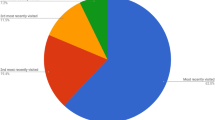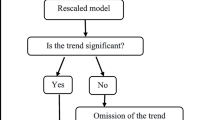Abstract
Despite advances in food safety regulations, food-borne illness imposes a heavy health burden, with nearly 50 million estimated incident cases of illness each year. Having a prospective foodborne illness outbreak detection mechanism for more accurate and timely triggering of outbreak control measures would offer notable public health dividends, but is challenging due to the subclinical character of most foodborne illnesses. Within this work, collected synthetic datasets of incident illness cases and vendor contamination records from a previously contributed and empirically grounded model of foodborne illness, are used to study the efficacy of Hidden Markov Models (HMMs) for syndromic surveillance monitoring and disease outbreak detection under two data collection regimes, one involving a sentinel population using smartphone-based app for tracing location of food consumption and subclinical reporting. A support vector machine (SVM) approach was applied to compare the results to the HMM. Findings suggest that while reliance on clinical data offers poor potential for automatic outbreak detection, the use of HMMs offer excellent potential for detecting foodborne illness outbreak when informed by subclinical reporting by even a very small (4% of population) sentinel group. By contrast, SVM offers relatively poor prospects for detection. Furthermore, experiments with an empirically grounded agent-based model suggest that use of an HMM may be advantageous for triggering outbreak investigations among public health inspectors.
Access this chapter
Tax calculation will be finalised at checkout
Purchases are for personal use only
Similar content being viewed by others
References
Morrison, K., Charland, K., Okhmatovskaia, A., Buckeridge, D.: A framework for detecting and classifying outbreaks of gastrointestinal disease. Online J. Pub. Health Inform. 5(1) (2013)
McPhee-Knowles, S.: The complex problem of food safety applying agent-based modeling to the policy process. Digital repository for the College of Graduate and Postdoctoral Studies electronic theses collection, University of Saskatchewan (2014)
Ethica Data: Ethicadata.ca, N.p. (2016). Accessed 29 Apr 2016
O’Connell, J., Hojsgaard, S.: Hidden semi Markov models for multiple observation sequences: the mhsmm package for R. J. Stat. Softw. 39(4), 1–22 (2011)
Author information
Authors and Affiliations
Corresponding author
Editor information
Editors and Affiliations
Rights and permissions
Copyright information
© 2017 Springer International Publishing AG
About this paper
Cite this paper
Teyhouee, A., McPhee-Knowles, S., Waldner, C., Osgood, N. (2017). Prospective Detection of Foodborne Illness Outbreaks Using Machine Learning Approaches. In: Lee, D., Lin, YR., Osgood, N., Thomson, R. (eds) Social, Cultural, and Behavioral Modeling. SBP-BRiMS 2017. Lecture Notes in Computer Science(), vol 10354. Springer, Cham. https://doi.org/10.1007/978-3-319-60240-0_36
Download citation
DOI: https://doi.org/10.1007/978-3-319-60240-0_36
Published:
Publisher Name: Springer, Cham
Print ISBN: 978-3-319-60239-4
Online ISBN: 978-3-319-60240-0
eBook Packages: Computer ScienceComputer Science (R0)




